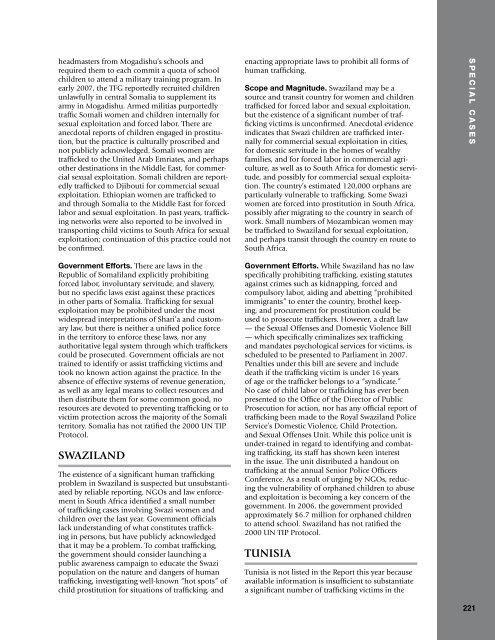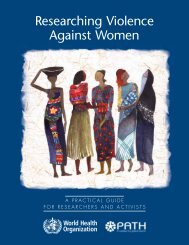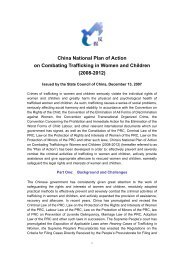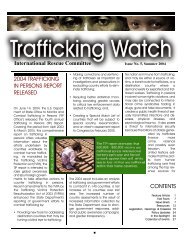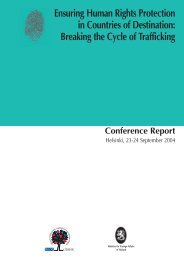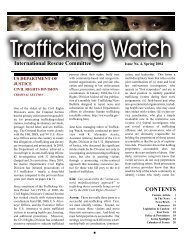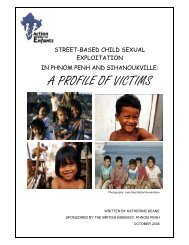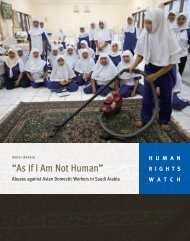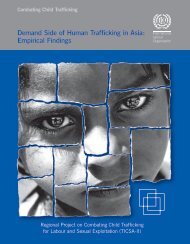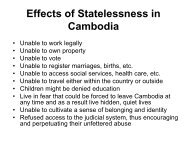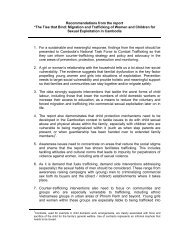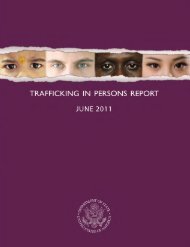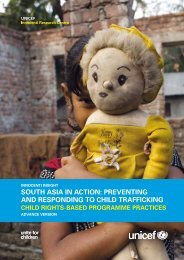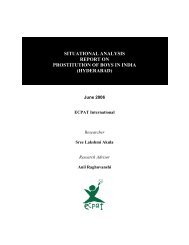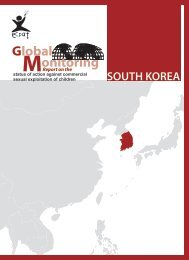2007 Trafficking in Persons Report - Center for Women Policy Studies
2007 Trafficking in Persons Report - Center for Women Policy Studies
2007 Trafficking in Persons Report - Center for Women Policy Studies
Create successful ePaper yourself
Turn your PDF publications into a flip-book with our unique Google optimized e-Paper software.
S P E C I A L C A S E S<br />
headmasters from Mogadishu’s schools and<br />
required them to each commit a quota of school<br />
children to attend a military tra<strong>in</strong><strong>in</strong>g program. In<br />
early <strong>2007</strong>, the TFG reportedly recruited children<br />
unlawfully <strong>in</strong> central Somalia to supplement its<br />
army <strong>in</strong> Mogadishu. Armed militias purportedly<br />
traffic Somali women and children <strong>in</strong>ternally <strong>for</strong><br />
sexual exploitation and <strong>for</strong>ced labor. There are<br />
anecdotal reports of children engaged <strong>in</strong> prostitution,<br />
but the practice is culturally proscribed and<br />
not publicly acknowledged. Somali women are<br />
trafficked to the United Arab Emriates, and perhaps<br />
other dest<strong>in</strong>ations <strong>in</strong> the Middle East, <strong>for</strong> commercial<br />
sexual exploitation. Somali children are reportedly<br />
trafficked to Djibouti <strong>for</strong> commercial sexual<br />
exploitation. Ethiopian women are trafficked to<br />
and through Somalia to the Middle East <strong>for</strong> <strong>for</strong>ced<br />
labor and sexual exploitation. In past years, traffick<strong>in</strong>g<br />
networks were also reported to be <strong>in</strong>volved <strong>in</strong><br />
transport<strong>in</strong>g child victims to South Africa <strong>for</strong> sexual<br />
exploitation; cont<strong>in</strong>uation of this practice could not<br />
be confirmed.<br />
enact<strong>in</strong>g appropriate laws to prohibit all <strong>for</strong>ms of<br />
human traffick<strong>in</strong>g.<br />
Scope and Magnitude. Swaziland may be a<br />
source and transit country <strong>for</strong> women and children<br />
trafficked <strong>for</strong> <strong>for</strong>ced labor and sexual exploitation,<br />
but the existence of a significant number of traffick<strong>in</strong>g<br />
victims is unconfirmed. Anecdotal evidence<br />
<strong>in</strong>dicates that Swazi children are trafficked <strong>in</strong>ternally<br />
<strong>for</strong> commercial sexual exploitation <strong>in</strong> cities,<br />
<strong>for</strong> domestic servitude <strong>in</strong> the homes of wealthy<br />
families, and <strong>for</strong> <strong>for</strong>ced labor <strong>in</strong> commercial agriculture,<br />
as well as to South Africa <strong>for</strong> domestic servitude,<br />
and possibly <strong>for</strong> commercial sexual exploitation.<br />
The country’s estimated 120,000 orphans are<br />
particularly vulnerable to traffick<strong>in</strong>g. Some Swazi<br />
women are <strong>for</strong>ced <strong>in</strong>to prostitution <strong>in</strong> South Africa,<br />
possibly after migrat<strong>in</strong>g to the country <strong>in</strong> search of<br />
work. Small numbers of Mozambican women may<br />
be trafficked to Swaziland <strong>for</strong> sexual exploitation,<br />
and perhaps transit through the country en route to<br />
South Africa.<br />
S P E C I A L C A S E S<br />
Government Ef<strong>for</strong>ts. There are laws <strong>in</strong> the<br />
Republic of Somaliland explicitly prohibit<strong>in</strong>g<br />
<strong>for</strong>ced labor, <strong>in</strong>voluntary servitude, and slavery,<br />
but no specific laws exist aga<strong>in</strong>st these practices<br />
<strong>in</strong> other parts of Somalia. <strong>Traffick<strong>in</strong>g</strong> <strong>for</strong> sexual<br />
exploitation may be prohibited under the most<br />
widespread <strong>in</strong>terpretations of Shari’a and customary<br />
law, but there is neither a unified police <strong>for</strong>ce<br />
<strong>in</strong> the territory to en<strong>for</strong>ce these laws, nor any<br />
authoritative legal system through which traffickers<br />
could be prosecuted. Government officials are not<br />
tra<strong>in</strong>ed to identify or assist traffick<strong>in</strong>g victims and<br />
took no known action aga<strong>in</strong>st the practice. In the<br />
absence of effective systems of revenue generation,<br />
as well as any legal means to collect resources and<br />
then distribute them <strong>for</strong> some common good, no<br />
resources are devoted to prevent<strong>in</strong>g traffick<strong>in</strong>g or to<br />
victim protection across the majority of the Somali<br />
territory. Somalia has not ratified the 2000 UN TIP<br />
Protocol.<br />
SWAZILAND<br />
The existence of a significant human traffick<strong>in</strong>g<br />
problem <strong>in</strong> Swaziland is suspected but unsubstantiated<br />
by reliable report<strong>in</strong>g. NGOs and law en<strong>for</strong>cement<br />
<strong>in</strong> South Africa identified a small number<br />
of traffick<strong>in</strong>g cases <strong>in</strong>volv<strong>in</strong>g Swazi women and<br />
children over the last year. Government officials<br />
lack understand<strong>in</strong>g of what constitutes traffick<strong>in</strong>g<br />
<strong>in</strong> persons, but have publicly acknowledged<br />
that it may be a problem. To combat traffick<strong>in</strong>g,<br />
the government should consider launch<strong>in</strong>g a<br />
public awareness campaign to educate the Swazi<br />
population on the nature and dangers of human<br />
traffick<strong>in</strong>g, <strong>in</strong>vestigat<strong>in</strong>g well-known “hot spots” of<br />
child prostitution <strong>for</strong> situations of traffick<strong>in</strong>g, and<br />
Government Ef<strong>for</strong>ts. While Swaziland has no law<br />
specifically prohibit<strong>in</strong>g traffick<strong>in</strong>g, exist<strong>in</strong>g statutes<br />
aga<strong>in</strong>st crimes such as kidnapp<strong>in</strong>g, <strong>for</strong>ced and<br />
compulsory labor, aid<strong>in</strong>g and abett<strong>in</strong>g “prohibited<br />
immigrants” to enter the country, brothel keep<strong>in</strong>g,<br />
and procurement <strong>for</strong> prostitution could be<br />
used to prosecute traffickers. However, a draft law<br />
— the Sexual Offenses and Domestic Violence Bill<br />
— which specifically crim<strong>in</strong>alizes sex traffick<strong>in</strong>g<br />
and mandates psychological services <strong>for</strong> victims, is<br />
scheduled to be presented to Parliament <strong>in</strong> <strong>2007</strong>.<br />
Penalties under this bill are severe and <strong>in</strong>clude<br />
death if the traffick<strong>in</strong>g victim is under 16 years<br />
of age or the trafficker belongs to a “syndicate.”<br />
No case of child labor or traffick<strong>in</strong>g has ever been<br />
presented to the Office of the Director of Public<br />
Prosecution <strong>for</strong> action, nor has any official report of<br />
traffick<strong>in</strong>g been made to the Royal Swaziland Police<br />
Service’s Domestic Violence, Child Protection,<br />
and Sexual Offenses Unit. While this police unit is<br />
under-tra<strong>in</strong>ed <strong>in</strong> regard to identify<strong>in</strong>g and combat<strong>in</strong>g<br />
traffick<strong>in</strong>g, its staff has shown keen <strong>in</strong>terest<br />
<strong>in</strong> the issue. The unit distributed a handout on<br />
traffick<strong>in</strong>g at the annual Senior Police Officers<br />
Conference. As a result of urg<strong>in</strong>g by NGOs, reduc<strong>in</strong>g<br />
the vulnerability of orphaned children to abuse<br />
and exploitation is becom<strong>in</strong>g a key concern of the<br />
government. In 2006, the government provided<br />
approximately $6.7 million <strong>for</strong> orphaned children<br />
to attend school. Swaziland has not ratified the<br />
2000 UN TIP Protocol.<br />
TUNISIA<br />
Tunisia is not listed <strong>in</strong> the <strong>Report</strong> this year because<br />
available <strong>in</strong><strong>for</strong>mation is <strong>in</strong>sufficient to substantiate<br />
a significant number of traffick<strong>in</strong>g victims <strong>in</strong> the<br />
221


